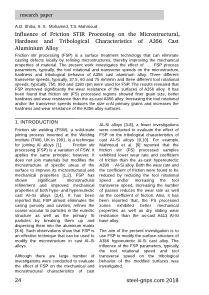Friction stir processing (FSP) is a surface treatment technology that can eliminate casting defects locally by refining microstructures, thereby improving the mechanical properties of material. The present work investigates the effect of FSP process parameters, typically, the tool rotational and transverse speeds on the microstructure, hardness and tribological behavior of A356 cast aluminum alloy. Three different transverse speeds, typically, 37.5, 60 and 75 mm/min and three different tool rotational speeds, typically, 750, 950 and 1180 rpm were used for FSP. The results revealed that FSP improved significantly the wear resistance of the surfaces of A356 alloy. It has been found that friction stir (FS) processed regions showed finer grain size, better hardness and wear resistance than the as-cast A356 alloy. Increasing the tool rotational and/or the transverse speeds reduces the size α-Al primary grains and increases the hardness and wear resistance of the A356 alloy surfaces.
Influence of Friction STIR Processing on the Microstructural, Hardness and Tribological Characteristics of A356 Cast Aluminium Alloy


